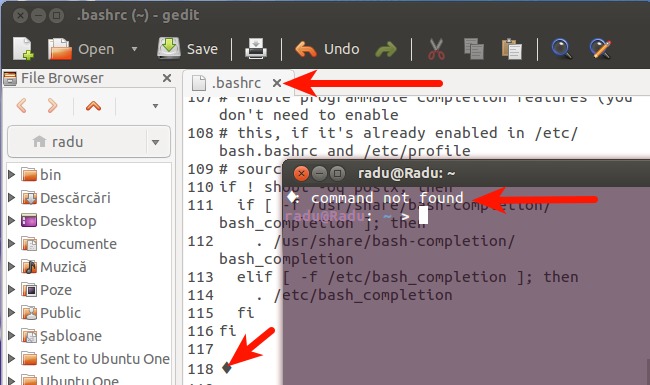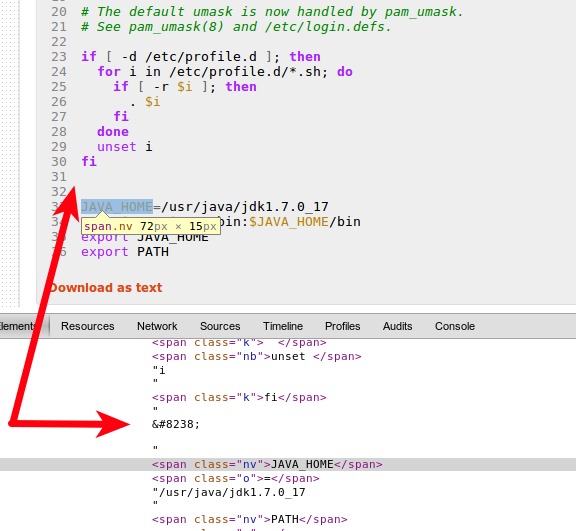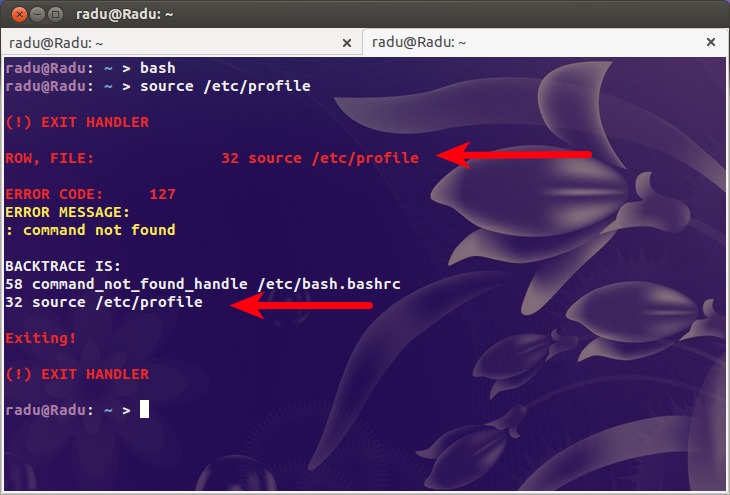问题描述
将Lubuntu从12.10升级到13.04后,我遇到了这个问题。
我按Ctrl + Alt + 1,输入登录名和密码,等待两秒钟,得到:♦: command not found"。出现此消息后,我可以键入命令而不会出现问题,但这是什么?
echo $PATH
/usr/lib/lightdm/lightdm:/usr/local/sbin:/usr/local/bin:/usr/sbin:/usr/bin:/sbin:/bin:/usr/games:/usr/local/games:/home/vitaly/bin:/usr/java/jdk1.7.0_17/bin
我的.bashrc文件是:
# ~/.bashrc: executed by bash(1) for non-login shells.
# see /usr/share/doc/bash/examples/startup-files (in the package bash-doc)
# for examples
# If not running interactively, don't do anything
case $- in
*i*) ;;
*) return;;
esac
# don't put duplicate lines or lines starting with space in the history.
# See bash(1) for more options
HISTCONTROL=ignoreboth
# append to the history file, don't overwrite it
shopt -s histappend
# for setting history length see HISTSIZE and HISTFILESIZE in bash(1)
HISTSIZE=1000
HISTFILESIZE=2000
# check the window size after each command and, if necessary,
# update the values of LINES and COLUMNS.
shopt -s checkwinsize
# If set, the pattern "**" used in a pathname expansion context will
# match all files and zero or more directories and subdirectories.
#shopt -s globstar
# make less more friendly for non-text input files, see lesspipe(1)
[ -x /usr/bin/lesspipe ] && eval "$(SHELL=/bin/sh lesspipe)"
# set variable identifying the chroot you work in (used in the prompt below)
if [ -z "${debian_chroot:-}" ] && [ -r /etc/debian_chroot ]; then
debian_chroot=$(cat /etc/debian_chroot)
fi
# set a fancy prompt (non-color, unless we know we "want" color)
case "$TERM" in
xterm-color) color_prompt=yes;;
esac
# uncomment for a colored prompt, if the terminal has the capability; turned
# off by default to not distract the user: the focus in a terminal window
# should be on the output of commands, not on the prompt
#force_color_prompt=yes
if [ -n "$force_color_prompt" ]; then
if [ -x /usr/bin/tput ] && tput setaf 1 >&/dev/null; then
# We have color support; assume it's compliant with Ecma-48
# (ISO/IEC-6429). (Lack of such support is extremely rare, and such
# a case would tend to support setf rather than setaf.)
color_prompt=yes
else
color_prompt=
fi
fi
if [ "$color_prompt" = yes ]; then
PS1='${debian_chroot:+($debian_chroot)}\[\033[01;32m\]\u@\h\[\033[00m\]:\[\033[01;34m\]\w\[\033[00m\]\$ '
else
PS1='${debian_chroot:+($debian_chroot)}\u@\h:\w\$ '
fi
unset color_prompt force_color_prompt
# If this is an xterm set the title to user@host:dir
case "$TERM" in
xterm*|rxvt*)
PS1="\[\e]0;${debian_chroot:+($debian_chroot)}\u@\h: \w\a\]$PS1"
;;
*)
;;
esac
# enable color support of ls and also add handy aliases
if [ -x /usr/bin/dircolors ]; then
test -r ~/.dircolors && eval "$(dircolors -b ~/.dircolors)" || eval "$(dircolors -b)"
alias ls='ls --color=auto'
#alias dir='dir --color=auto'
#alias vdir='vdir --color=auto'
alias grep='grep --color=auto'
alias fgrep='fgrep --color=auto'
alias egrep='egrep --color=auto'
fi
# some more ls aliases
alias ll='ls -alF'
alias la='ls -A'
alias l='ls -CF'
# Add an "alert" alias for long running commands. Use like so:
# sleep 10; alert
alias alert='notify-send --urgency=low -i "$([ $? = 0 ] && echo terminal || echo error)" "$(history|tail -n1|sed -e '\''s/^\s*[0-9]\+\s*//;s/[;&|]\s*alert$//'\'')"'
# Alias definitions.
# You may want to put all your additions into a separate file like
# ~/.bash_aliases, instead of adding them here directly.
# See /usr/share/doc/bash-doc/examples in the bash-doc package.
if [ -f ~/.bash_aliases ]; then
. ~/.bash_aliases
fi
# enable programmable completion features (you don't need to enable
# this, if it's already enabled in /etc/bash.bashrc and /etc/profile
# sources /etc/bash.bashrc).
if ! shopt -oq posix; then
if [ -f /usr/share/bash-completion/bash_completion ]; then
. /usr/share/bash-completion/bash_completion
elif [ -f /etc/bash_completion ]; then
. /etc/bash_completion
fi
fi
我的.profile文件是:
# ~/.profile: executed by the command interpreter for login shells.
# This file is not read by bash(1), if ~/.bash_profile or ~/.bash_login
# exists.
# see /usr/share/doc/bash/examples/startup-files for examples.
# the files are located in the bash-doc package.
# the default umask is set in /etc/profile; for setting the umask
# for ssh logins, install and configure the libpam-umask package.
#umask 022
# if running bash
if [ -n "$BASH_VERSION" ]; then
# include .bashrc if it exists
if [ -f "$HOME/.bashrc" ]; then
. "$HOME/.bashrc"
fi
fi
# set PATH so it includes user's private bin if it exists
if [ -d "$HOME/bin" ] ; then
PATH="$HOME/bin:$PATH"
fi
文件/etc/profile在这里:http://paste.ubuntu.com/5781361/
最佳回答
Workaround
首先,我认为您指的是何时进入tty1-Ctrl + Alt + F1。
现在,我认为您正在说的最有可能是因为您在~/.bashrc或~/.profile文件或包含各种初始化命令的其他文件中有一个奇怪的字符,例如♦(菱形西装字符或Askubuntu版主的特殊徽章)。
如下图所示,我编辑了~/.bashrc文件,该文件放在♦字符中的一行上。结果,当我打开终端时,会遇到您描述的问题:

当我使用Ctrl + Alt + F1进入tty1时,情况也是一样。
调用 shell 程序时包含初始化命令的文件:/etc/profile,/etc/bashrc,~/.bash_login, ~/.profile,~/.bashrc,~/.bash_aliases以及其他。参见Shell initialization files。
要快速检查其中一个文件是否内部有问题,可以使用source命令。例如:
source ~/.bashrc

最终解决方案
从http://paste.ubuntu.com/5781361/检查了/etc/profile之后,我发现在第31行上有“从右向左重写”- Unicode字符。只需使用sudo -H gedit /etc/profile打开/etc/profile文件,请确保删除此奇怪字符,问题将消失。

有趣的是,例如在HTML中,如果您在行的前面使用十进制代码()插入此unicode字符,请查看发生了什么:
This text is in arabic-english!
另一个更通用的解决方案
我们将使用“ trap”找到导致错误的确切命令。
首先,我们必须在~/bin目录中创建一个新的脚本文件,我们将其称为lib.trap.sh(gedit ~/bin/lib.trap.sh),并在其中包含以下内容:
lib_name='trap'
lib_version=20130620
#changed from lib_version=20121026 found it at https://stackoverflow.com/a/13099228/2353900 to work well at initialization of the shell
stderr_log="/dev/shm/stderr.log"
#
# TO BE SOURCED ONLY ONCE:
#
###~~~~~~~~~~~~~~~~~~~~~~~~~~~~~~~~~~~~~~~~~~~~~~~~~~~~~~~~~~~~~~~~~~~##
if test "${g_libs[$lib_name]+_}"; then
return 0
else
if test ${#g_libs[@]} == 0; then
declare -A g_libs
fi
g_libs[$lib_name]=$lib_version
fi
#
# MAIN CODE:
#
###~~~~~~~~~~~~~~~~~~~~~~~~~~~~~~~~~~~~~~~~~~~~~~~~~~~~~~~~~~~~~~~~~~~##
set -o pipefail # trace ERR through pipes
set -o errtrace # trace ERR through 'time command' and other functions
set -o nounset ## set -u : exit the script if you try to use an uninitialised variable
set -o errexit ## set -e : exit the script if any statement returns a non-true return value
exec 2>"$stderr_log"
###~~~~~~~~~~~~~~~~~~~~~~~~~~~~~~~~~~~~~~~~~~~~~~~~~~~~~~~~~~~~~~~~~~~##
#
# FUNCTION: EXIT_HANDLER
#
###~~~~~~~~~~~~~~~~~~~~~~~~~~~~~~~~~~~~~~~~~~~~~~~~~~~~~~~~~~~~~~~~~~~##
function exit_handler ()
{
local error_code="$?"
test $error_code == 0 && return;
#
# LOCAL VARIABLES:
# ------------------------------------------------------------------
#
local i=0
local regex=''
local mem=''
local error_file=''
local error_lineno=''
local error_message='unknown'
local lineno=''
#
# PRINT THE HEADER:
# ------------------------------------------------------------------
#
# Color the output if it's an interactive terminal
test -t 1 && tput bold; tput setf 4 ## red bold
echo -e "\n(!) EXIT HANDLER\n"
#
# GETTING LAST ERROR OCCURRED:
# ~~~~~~~~~~~~~~~~~~~~~~~~~~~~~~~~~~~~~~~~~~~~~~~~~~~~~~~~~~~~~~~~ #
#
# Read last file from the error log
# ------------------------------------------------------------------
#
if test -f "$stderr_log"
then
stderr=$( tail -n 1 "$stderr_log" )
rm "$stderr_log"
fi
#
# Managing the line to extract information:
# ------------------------------------------------------------------
#
if test -n "$stderr"
then
# Exploding stderr on :
mem="$IFS"
local shrunk_stderr=$( echo "$stderr" | sed 's/\: /\:/g' )
IFS=':'
local stderr_parts=( $shrunk_stderr )
IFS="$mem"
# Storing information on the error
error_file="${stderr_parts[0]}"
error_lineno="${stderr_parts[1]}"
error_message=""
for (( i = 3; i <= ${#stderr_parts[@]}; i++ ))
do
error_message="$error_message "${stderr_parts[$i-1]}": "
done
# Removing last ':' (colon character)
error_message="${error_message%:*}"
# Trim
error_message="$( echo "$error_message" | sed -e 's/^[ \t]*//' | sed -e 's/[ \t]*$//' )"
fi
#
# GETTING BACKTRACE:
# ~~~~~~~~~~~~~~~~~~~~~~~~~~~~~~~~~~~~~~~~~~~~~~~~~~~~~~~~~~~~~~~~ #
_backtrace=$( backtrace 2 )
#
# MANAGING THE OUTPUT:
# ~~~~~~~~~~~~~~~~~~~~~~~~~~~~~~~~~~~~~~~~~~~~~~~~~~~~~~~~~~~~~~~~ #
local lineno=""
regex='^([a-z]{1,}) ([0-9]{1,})$'
if [[ $error_lineno =~ $regex ]]
# The error line was found on the log
# (e.g. type 'ff' without quotes wherever)
# --------------------------------------------------------------
then
local row="${BASH_REMATCH[1]}"
lineno="${BASH_REMATCH[2]}"
echo -e "FILE:\t\t${error_file}"
echo -e "${row^^}:\t\t${lineno}\n"
echo -e "ERROR CODE:\t${error_code}"
test -t 1 && tput setf 6 ## white yellow
echo -e "ERROR MESSAGE:\n$error_message"
else
regex="^${error_file}\$|^${error_file}\s+|\s+${error_file}\s+|\s+${error_file}\$"
if [[ "$_backtrace" =~ $regex ]]
# The file was found on the log but not the error line
# (could not reproduce this case so far)
# ------------------------------------------------------
then
echo -e "FILE:\t\t$error_file"
echo -e "ROW:\t\tunknown\n"
echo -e "ERROR CODE:\t${error_code}"
test -t 1 && tput setf 6 ## white yellow
echo -e "ERROR MESSAGE:\n${stderr}"
# Neither the error line nor the error file was found on the log
# (e.g. type 'cp ffd fdf' without quotes wherever)
# ------------------------------------------------------
else
#
# The error file is the first on backtrace list:
# Exploding backtrace on newlines
mem=$IFS
IFS='
'
#
# Substring: I keep only the carriage return
# (others needed only for tabbing purpose)
IFS=${IFS:0:1}
local lines=( $_backtrace )
IFS=$mem
error_file=""
if test -n "${lines[1]}"
then
array=( ${lines[1]} )
for (( i=2; i<${#array[@]}; i++ ))
do
error_file="$error_file ${array[$i]}"
done
# Trim
error_file="$( echo "$error_file" | sed -e 's/^[ \t]*//' | sed -e 's/[ \t]*$//' )"
fi
echo -e "ROW, FILE:\t\t${lines[2] }\n"
echo -e "ERROR CODE:\t${error_code}"
test -t 1 && tput setf 6 ## white yellow
if test -n "${stderr}"
then
echo -e "ERROR MESSAGE:\n${stderr}"
else
echo -e "ERROR MESSAGE:\n${error_message}"
fi
fi
fi
#
# PRINTING THE BACKTRACE:
# ~~~~~~~~~~~~~~~~~~~~~~~~~~~~~~~~~~~~~~~~~~~~~~~~~~~~~~~~~~~~~~~~ #
test -t 1 && tput setf 7 ## white bold
echo -e "\n$_backtrace\n"
#
# EXITING:
# ~~~~~~~~~~~~~~~~~~~~~~~~~~~~~~~~~~~~~~~~~~~~~~~~~~~~~~~~~~~~~~~~ #
test -t 1 && tput setf 4 ## red bold
echo "Exiting!"
test -t 1 && tput sgr0 # Reset terminal
exit "$error_code"
}
trap exit_handler ERR # ! ! ! TRAP EXIT ! ! !
#trap exit ERR # ! ! ! TRAP ERR ! ! !
###~~~~~~~~~~~~~~~~~~~~~~~~~~~~~~~~~~~~~~~~~~~~~~~~~~~~~~~~~~~~~~~~~~~##
#
# FUNCTION: BACKTRACE
#
###~~~~~~~~~~~~~~~~~~~~~~~~~~~~~~~~~~~~~~~~~~~~~~~~~~~~~~~~~~~~~~~~~~~##
function backtrace
{
local _start_from_=0
local params=( "$@" )
if (( "${#params[@]}" >= "1" ))
then
_start_from_="$1"
fi
local i=0
local first=false
while caller $i > /dev/null
do
if test -n "$_start_from_" && (( "$i" + 1 >= "$_start_from_" ))
then
if test "$first" == false
then
echo "BACKTRACE IS:"
first=true
fi
caller $i
fi
let "i=i+1"
done
}
return 0
现在,您唯一要做的就是将下一行放在文件/etc/profile(sudo -H gedit /etc/profile)的开头:
source '/home/<user_name>/bin/lib.trap.sh'
用您的用户名更改<user_name>。这样,在调用shell时,所有包含初始化命令的文件都将通过”trap”。
例如,要测试/etc/profile中是否有错误的命令,请在terminal next命令中运行:
bash源/etc /profile
如果出现问题(例如在这种情况下),结果将是:

因此,现在我们可以肯定地知道第32行的/etc/profile文件中存在问题(command not found)(它不在上面的第31行,因为我们在文件的开头插入了新行)。
非常感谢Luca Borrione的this answer脚本帮助我完成了该通用解决方案。
次佳回答
要调试bash的初始化脚本,请运行以下命令(在虚拟控制台上登录后)。
PS4='+ $BASH_SOURCE:$LINENO:' bash -xlic ''
上面的代码在交互式(-i)登录(-l)模式下运行bash,与登录虚拟控制台时的login程序相同。 -c ''使它在通过初始化脚本运行后立即退出,并且-x和PS4=...使它在运行每个命令之前输出每个命令,以及该命令的文件名和行号。那应该有助于确定无效命令位于哪个文件的哪一行。
附带说明,♦是虚拟控制台默认字体用于打印没有符号的字符的符号。
